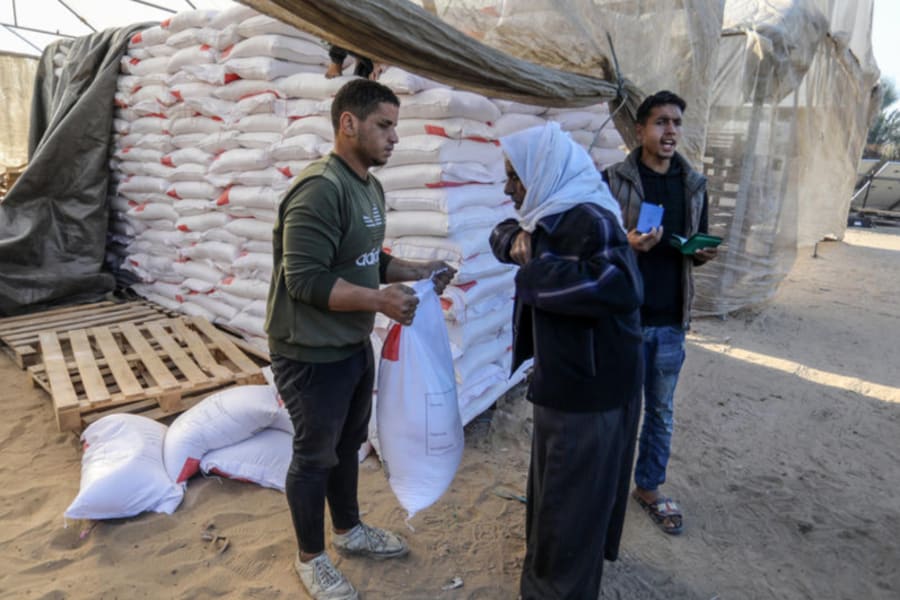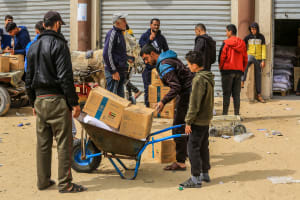US initiative to distribute humanitarian aid in Gaza, bypassing UN, was planned in Israel
Gaza Humanitarian Foundation is the US organization tasked with carrying out aid distribution

According to a story in the New York Times, the idea of using private American firms to distribute humanitarian aid in Gaza, a key component of Operation Gideon’s Chariots, was originally developed by Israeli officials.
Since the start of the war, the distribution of humanitarian aid in Gaza has largely been carried out by the United Nations, along with a few international aid organizations. However, Israel has routinely complained that Hamas is seizing significant amounts of that aid, which is providing material support to the terror organization and prolonging the war effort.
Hostages released in the two major hostage-ceasefire agreements have also testified that Hamas often brought humanitarian aid supplies into the tunnels for its own use. The Israeli government has also released evidence that several high-level UN workers in Gaza are affiliated with Hamas, lending credence to Israel’s claims that the entry of humanitarian aid into Gaza has benefited Hamas.
With the announcement of Operation Gideon’s Chariots, following the breakdown of the hostage-ceasefire agreement in early March, Israel also announced a new system for the distribution of humanitarian aid in Gaza, intended to prevent aid from reaching the Hamas terror group.
The new plan was billed as an American initiative that would release the IDF from having to oversee aid distribution while fighting Hamas in the renewed ground campaign.
According to the New York Times, the new aid initiative is actually an Israeli plan, conceived by several well-known figures in the defense establishment shortly after the war began. The group realized that aid seizure by Hamas would prolong the war effort and lead to the suffering of Palestinian civilians in Gaza. The group also distrusted the United Nations agencies as being truly neutral and wanted a system that would avoid the use of UN agencies and partners.
Among the officials who met to discuss a new system for aid distribution were Yotam HaCohen, a strategic consultant who joined the Coordinator of Government Activities in the Territories (COGAT), Liran Tancman, a tech investor who also joined COGAT, and Michael Eisenberg, an Israeli-American venture capitalist.
The group met early after the start of the war, calling themselves the Mikveh Yisrael Forum, after the name of the college where the members first met. They began to discuss a plan to undermine Hamas’ control over Gaza, while also bypassing the United Nations, which they saw as corrupt and complicit in Hamas’ reign of terror in the enclave.
HaCohen wrote an article for a journal published by the IDF last July, in which he laid out a plan similar to the one being implemented by the newly formed Gaza Humanitarian Foundation.
“To meet the war’s goals over the long term, Israel needs to develop tools that will pull the rug out from under the Hamas movement and not just (temporarily) dismantle the Hamas government,” HaCohen wrote in the journal. “Pulling the rug out will come once Israel begins to work directly with the civilian population, manages the distribution of aid itself, and begins to take responsibility for building the ‘day-after.’”
The Gaza Humanitarian Foundation, the humanitarian group funding the new aid distribution system in Gaza, is run by Jake Wood, a former U.S. Marine. The foundation is partnering with Safe Reach Solutions, a security firm run by Philip F. Reilly, a former senior CIA officer. Reilly was contacted by the Mikveh Yisrael Forum after the plan had been discussed with Israeli government officials.
Both officials have said that they are acting independently from Israel. Wood acknowledged dialogue with the IDF on the location of aid sites, but said, “I would participate in no plan in any capacity if it was an extension of an IDF plan or an Israeli government plan to forcibly dislocate people anywhere within Gaza.”
Safe Reach Solutions (SRS) is the team that hired contractors to operate a checkpoint between southern and northern Gaza during the hostage-ceasefire deal, which began in January. The group screened cars passing through the checkpoint to prevent the transfer of weapons.
Now, SRS will be tasked with overseeing the aid distribution at points established in safe zones in the Gaza Strip. Those zones will be set up in areas cleared by the IDF. Gaza residents will have to pass an Israeli security checkpoint to arrive at the aid distribution points.
The UN has opposed the Israeli plan, claiming it would restrict the amount of aid reaching Gaza civilians, while also further endangering the civilians by making them cross near areas of active combat to reach the safe zones.
The Times investigation points out that the source of funding for the two organizations is not clear. The two groups also appear to have been founded by the same individuals, despite claiming to be independent organizations.
Wood claims his organization, the Gaza Humanitarian Foundation, has received funding from a group of businessmen, but did not tell the Times who they were. He also claimed to have received a $100 million donation from a Western European country, but also declined to identify the country.

The All Israel News Staff is a team of journalists in Israel.
You might also like to read this:
















